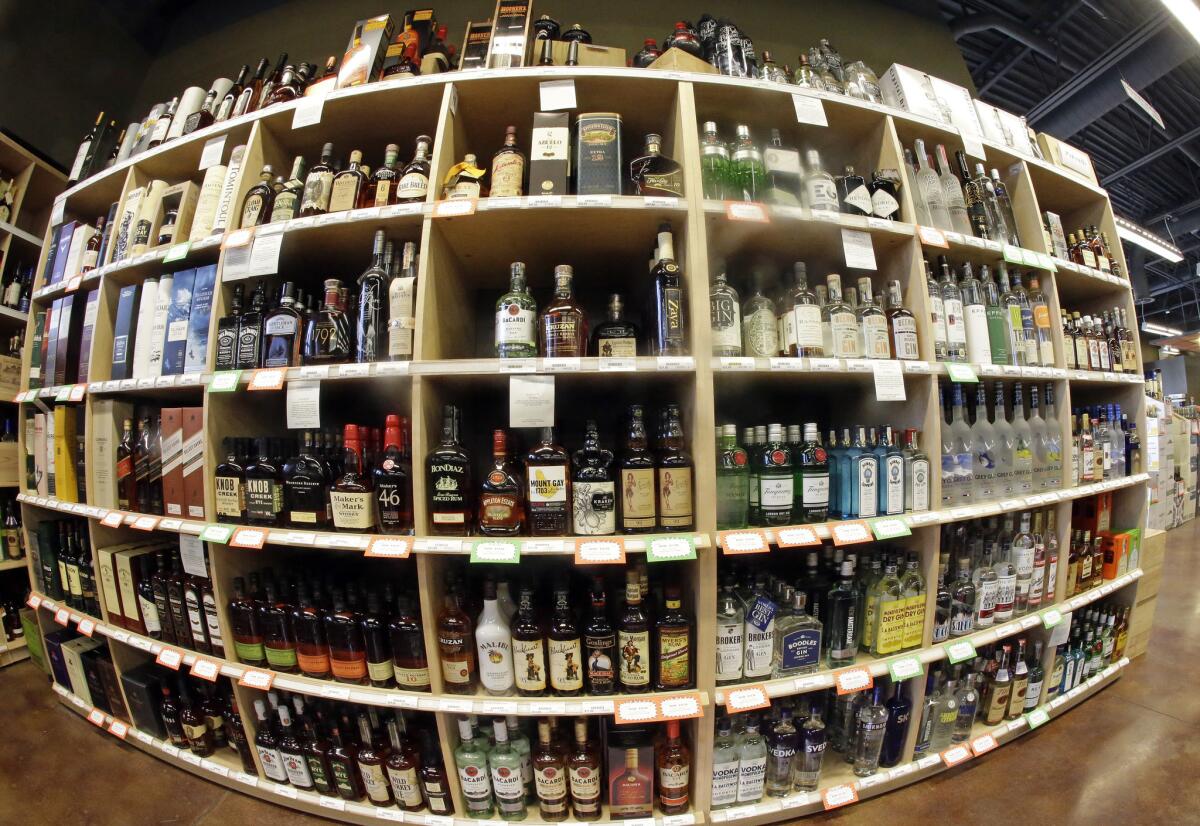Utah may lower the legal alcohol limit to .05% — a first in the nation

- Share via
If a tough new proposal in Utah becomes law, just a few drinks — or even a few swigs — could put you over the limit for drunk driving.
An effort is underway in the state to lower the legal blood-alcohol concentration for driving to .05 — a first in the nation. Currently, all 50 states have a .08 cap, eschewing suggestions from the National Transportation Safety Board to redefine what constitutes drunk driving.
But state Rep. Norman Thurston, a Republican from Provo who plans to introduce a bill on the issue in the upcoming legislative session, wants that to change in 2017.
“Impairment starts with the first drink, and we want to establish this state as one where you just simply do not drink and drive,” said Thurston, noting he worked with officials from the Utah Highway Patrol while drafting the legislation. “This is all about safety.”
Impairment starts with the first drink, and we want to establish this state as one where you just simply do not drink and drive.
— Norman Thurston, Utah state representative
And the safety concern is timely.
Deaths related to drunk driving nearly doubled in Utah between 2013 and 2014, increasing from 23 to 45. Conversely, drunk driving fatalities nationally have fallen by a third in the last three decades, according to the National Highway Traffic Safety Administration. Nationally, 28 people die every day in motor vehicle crashes involving an alcohol-impaired driver, according to the agency.
A Centers for Disease Control and Prevention chart shows how a blood-alcohol concentration of .05 — about three drinks in one hour for a 160-pound man — causes, among other things, altered coordination, reduced ability to track moving objects and difficulty steering a motor vehicle.
For men weighing less than 160 pounds and for women, it takes even fewer drinks to reach the .05 threshold. If Utah makes the change, it will join several countries in Europe — such as Austria, France and Germany — that have blood-alcohol limits of .05. (In Poland, it’s .02).
In 2013, the NTSB released a report recommending that states lower to .05 the limit at which people can be prosecuted for drunk driving.
While the national board characterized its proposal as a way to prevent drunk driving deaths, restaurant industry groups pushed back, questioning the effectiveness of such a change. The American Beverage Institute portrayed it as “criminalizing perfectly responsible behavior.”
That’s the same argument coming from some detractors of the proposed legislation in Utah.
“Why not focus on reducing the speed limit, or limiting texting while driving?” said Connor Boyack, president of the libertarian-leaning Libertas Institute, located outside Salt Lake City. “Those are real factors in causing traffic deaths.… This would just criminalize people not causing any problems.”
Art Brown, president of the Utah chapter of Mothers Against Drunk Driving, told the local Fox affiliate the group would not support Thurston’s proposal. Instead, he said, the group prefers to focus on interlock devices prohibiting people from driving drunk.
“MADD’s position is we really emphasize interlocks and getting those on people and staying .08,” Brown said.
The state has long had a fraught relationship with alcohol. Mormons, who are forbidden from drinking liquor, make up nearly 60% of the population.
Even so, annual liquor sales have increased, up from $367.2 million in 2014 to $396.4 million in 2015. The Utah Department of Alcoholic Beverage Control oversees all licensing and runs the state’s liquor stores.
A state audit released in September found the number of liquor stores in Utah so inadequate that adding 19 would just keep up with demand. Moreover, efforts are afoot to repeal a state law that requires cocktails made at bars and restaurants be prepared out of patrons’ sight.
In Utah, alcohol is not a major cause of fatal automobile crashes. Drunk driving was a contributing factor in about 13% of fatal crashes last year, according to the Utah Highway Safety Office. By contrast, speed played a role in 37% of deaths, and no seat belt use was a factor in 31%.
Still, Diane Christensen, a member of the Provo Landmarks Commission and Thurston’s neighbor, lauded the effort. In 1979, as her older brother walked along a street in downtown Salt Lake City after a concert, he was hit and killed by a drunk driver.
“I just have never got over it after all these years,” said Christensen, who said she would testify in support of the measure, if needed, as it makes its way through legislative committees in the months ahead.
Thurston, who is Mormon and does not drink, says he takes no pride in Utah possibly becoming the first state in the country to lower the blood-alcohol concentration limit to .05.
“In fact, I wish we were the 50th state to do it,” he said. “This is something that should have happened a long time ago.”
Twitter: @kurtisalee
ALSO
Russian malware found at Vermont electric utility
This Congress filled the fewest judgeships since 1952. That leaves a big opening for Trump
In a policy shift, New York Police Department will allow beards and turbans for religious officers
More to Read
Sign up for Essential California
The most important California stories and recommendations in your inbox every morning.
You may occasionally receive promotional content from the Los Angeles Times.














